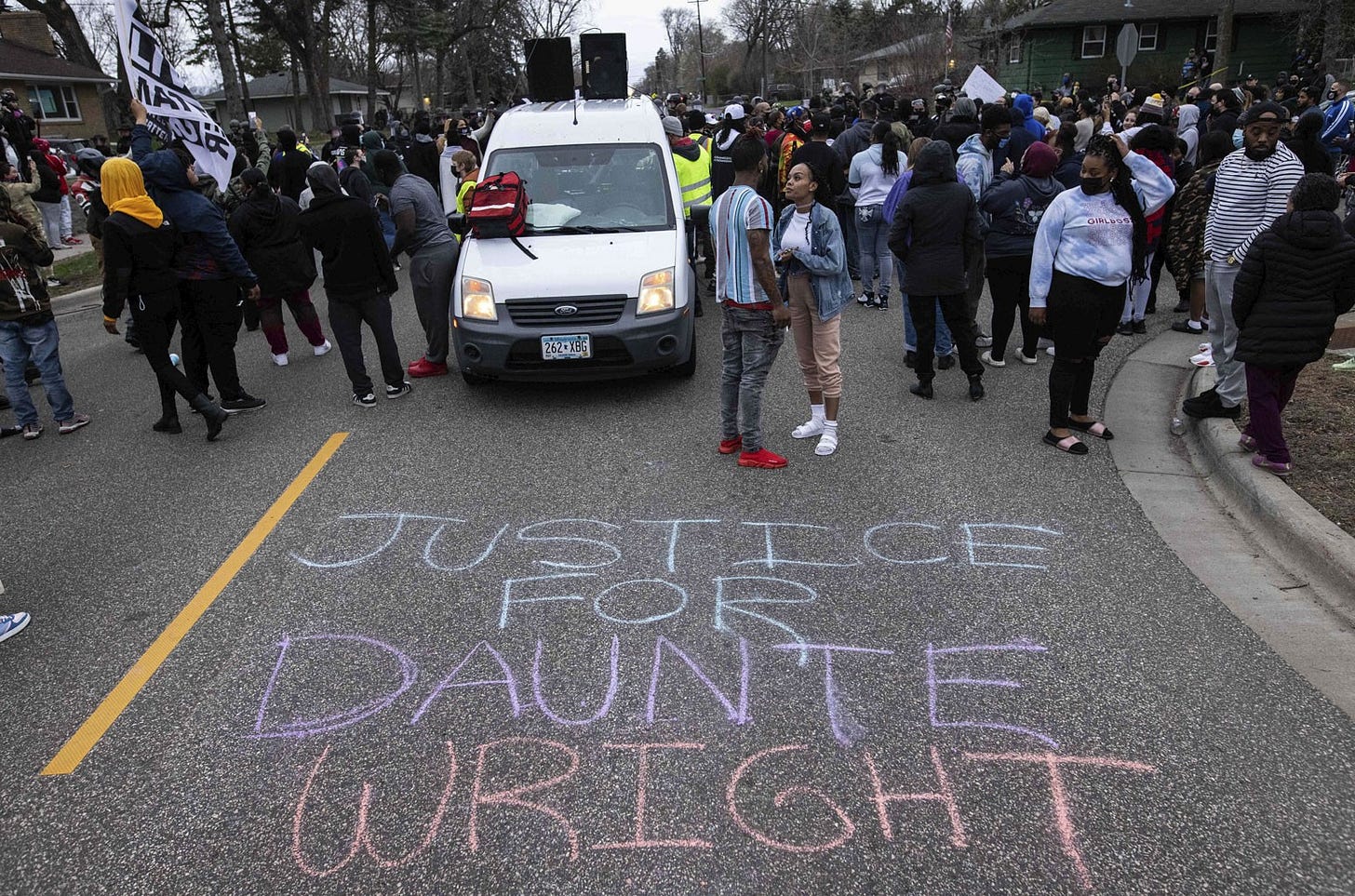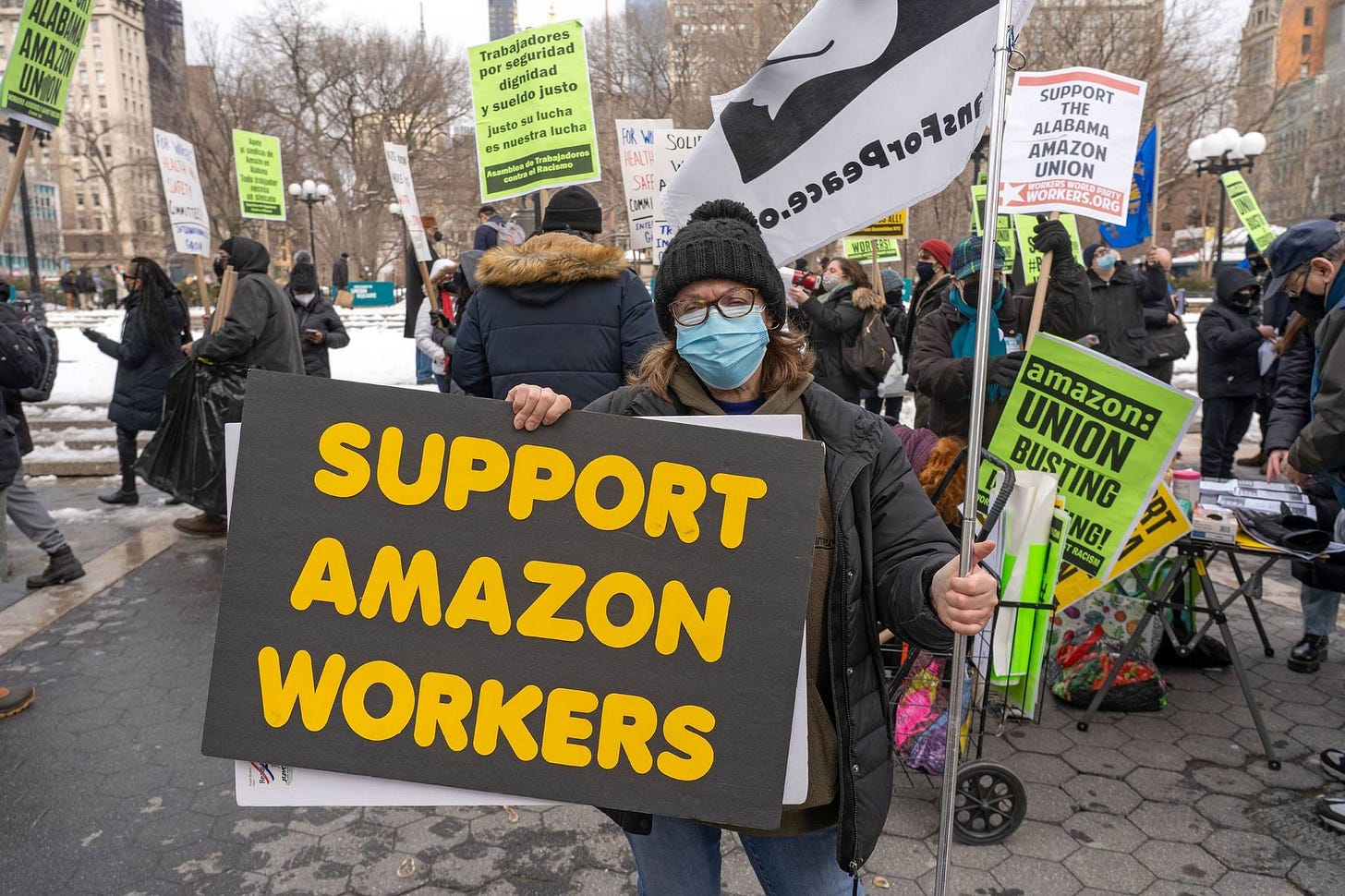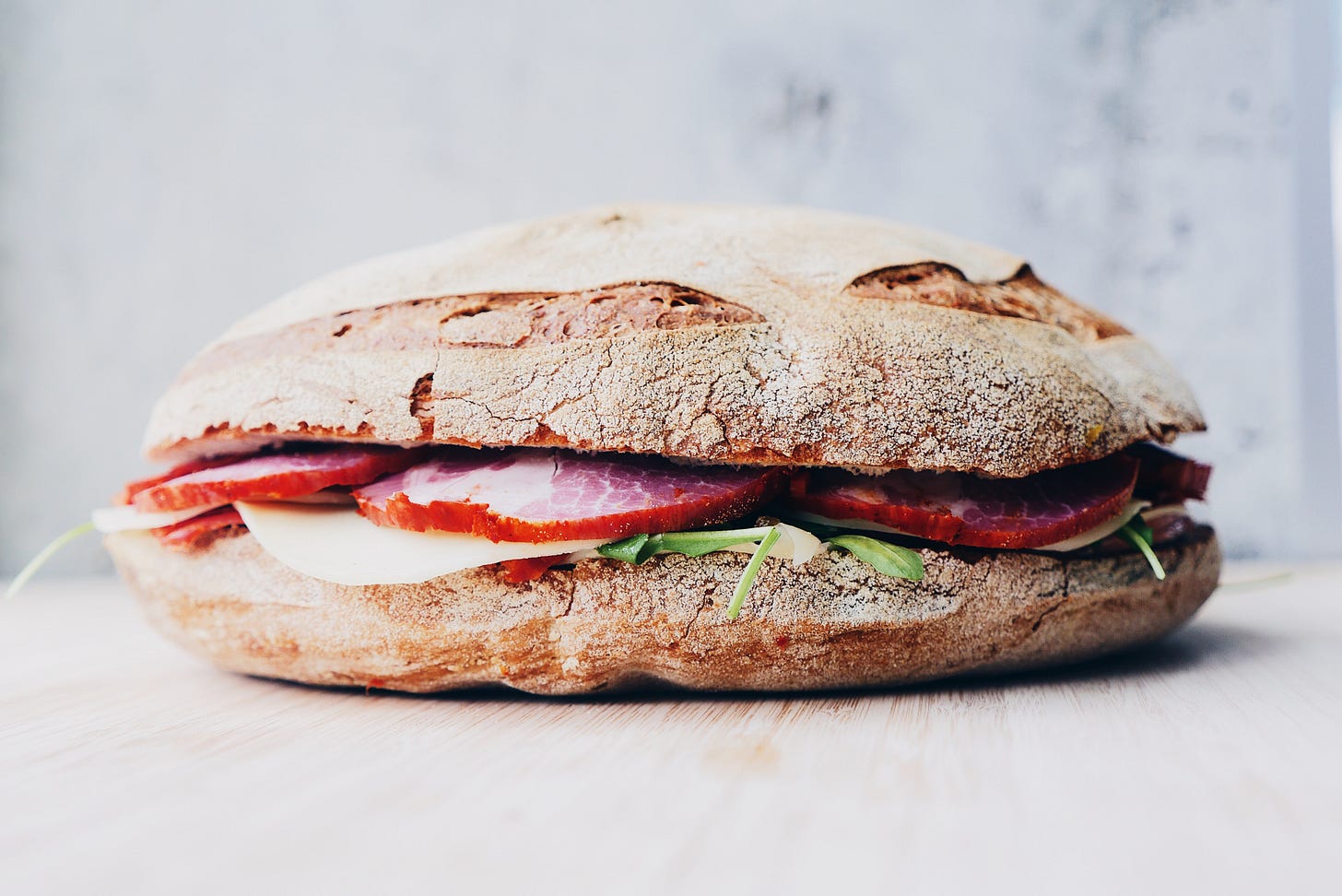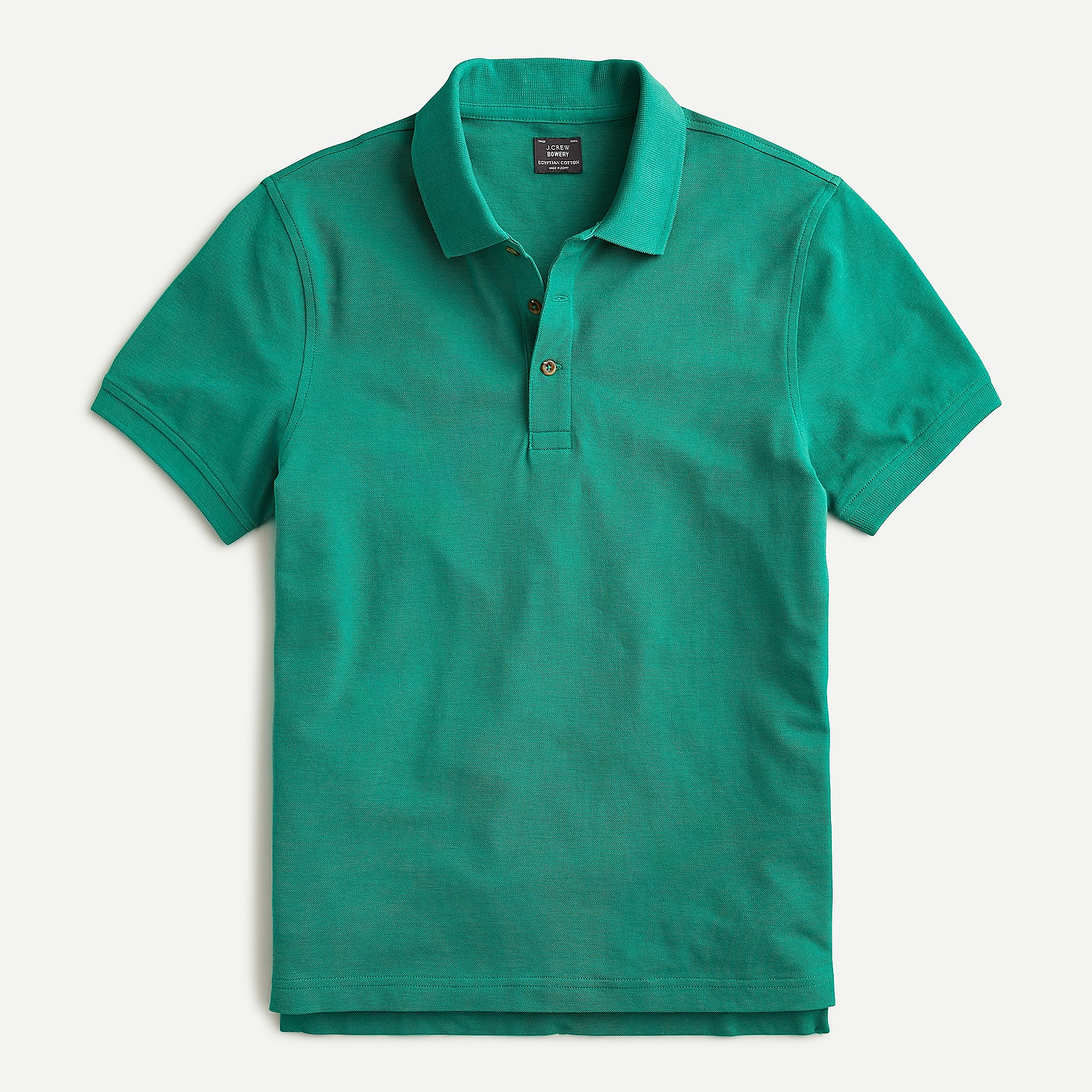An arrest has been made
The cop who killed Daunte Wright was charged with second-degree manslaughter. Plus: New polling on labor unions and a breathable polo shirt in my favorite spring color.
— Culture
The officer who murdered 20-year-old Daunte Wright in Minnesota on Sunday was arrested and charged with second-degree manslaughter earlier today. Under state law, the maximum punishment for a conviction is 10 years in prison, but sentencing guidelines can lower the term to four years for someone with no criminal history.
— Coronavirus
Dr. Anthony Fauci said that he expects the pause on administering the Johnson & Johnson COVID-19 vaccine should last for days or weeks: “I don’t think this is going to drag out,” the director of the National Institute of Allergy and Infectious Diseases added. (Check out this conversation between Rachel Maddow and US Surgeon General Vivek Murthy for more knowledge on why J&J vaccinations were put on hold in the first place and what it means for people who have already received the vaccine.)
— Politics
President Joe Biden accepted an invitation from House Speaker Nancy Pelosi to address a joint session of Congress on April 28, which marks his 100th day in office.
New data from the Education Department estimates that $50,000 of student loan forgiveness would wipe out federal debt for 36 million people.
Three Senate Democrats — Sens. Cory Booker of New Jersey and Ron Wyden of Oregon and Majority Leader Chuck Schumer of New York — plan to introduce a comprehensive cannabis bill to decriminalize marijuana nationally. The bill would need at least 10 Republican votes to pass.
Speaking of drugs: Liberals are pissed at the Biden administration for its decision to extend a Trump administration policy that imposes harsh mandatory minimums for people caught with fentanyl, an addictive opioid. Critics would prefer to solve the epidemic through public health, not criminal justice.
Biden’s infrastructure proposal is backed by three in five voters. But support from GOP voters fell 10 points to 25 percent in just a week.
The White House is warming up to Corporate America and hoping to transform those relationships in meaningful progress on their policy priorities. The administration could form an advisory group of business leaders in the footsteps of President Barack Obama and Donald T****.
Nearly a dozen members of the almost-60 member Black Congressional Caucus visited the White House for the first time in four years to discuss its legislative agenda with the president, including the George Floyd Justice in Policing Act.
— Business
Tennis star Serena Williams signed a first-look TV deal with Amazon. She’ll develop both scripted and unscripted projects at Amazon, starting with an untitled docuseries about her personal and professional life.
TikTok claims its US ad business had grown more than 500 percent in the past year and is on track to become the next billion-user social app. Of those users, almost six in 10 are under 24 and another 17 percent are aged 13 to 17.
Project management software Asana launched Asana Partners, a new initiative that oversees how other companies use its app and will empower those partners to sell its tools to a broader enterprise audience.
Grove, a billion-dollar eco-friendly cleaning startup, is expanding into physical retail for the first time with a deal to sell its products through Target stores nationwide starting this month.
Spotify has quietly removed over 40 episodes of The Joe Rogan Experience, a podcast it paid $100 million to its controversial namesake host.
— Tech
Instagram announced a “small global test” that will enable users to choose not to see like counts on anyone’s posts, turn them off for their own posts or continue seeing them all together. A “similar experience” could be coming to Facebook, which also owns IG.
For Subscribers Only
In the aftermath of the failed drive to unionize Amazon workers in Bessemer, Alabama, a new poll from Morning Consult and Politico found that 73 percent of registered voters support workers’ right to collectively bargain but only 54 said they favor labor unions. I wrote about why we should support workers to want a fairer — and more sustainable — share of the value their skilled labor generates:
Voters should understand that it’s OK for workers to want a fairer share of the value their skilled labor generates. Amazon is worth nearly $1.7 trillion. Its CEO Jeff Bezos is worth $197 billion. And despite earning record-breaking profits in 2020, the company saved $1.8 billion using tax breaks for stock options and another $639 million using various tax credits. $15 feels like a lot simply because the federal minimum wage is less than half of Amazon’s starting rate. But according to this analysis, it still doesn’t offer a living wage to low-paid single adults and families in many areas. Even though we’re more than a year into the pandemic, it’s clear that too many people still disproportionately attribute Amazon and Bezos’s success to sheer ingenuity and feel that the company’s workers could probably alter their fortunes if they pulled themselves up by the bootstraps a wee-bit harder and doubled-down on some good ol’ personal responsibility.
Read the full post or subscribe to The Supercreator for access.
Read All About It
David Pierce at Protocol on food blogging:
To be a food blogger is to try to balance a huge number of competing interests. You want to create recipes and run a site that you like, that's readable and useful. You also want to make money. And you know that Google is your meal ticket. "If Google isn't your No. 1 source of traffic, you have a problem," said Casey Markee, an SEO consultant who has worked with hundreds of food bloggers on improving their site and business. Pinterest is typically second, and Instagram and Facebook are currently in a heated competition for third place. Even TikTok is a space most food bloggers are thinking about now. But Google dominates.
Practically everything on a recipe website is dictated either by Google or by ad networks. Recipe cards are almost always at the bottom of a page, for instance, because when users spend even a few more seconds on a page it signals to Google that this was a useful search result. The life stories, Markee said, are mostly about the ad networks. "Word count is not a factor" for Google, he said, but more paragraphs and photos means more ad slots. (Advertisers hate the "jump to recipe" button.)
Mitchell S. Jackson at Esquire on modern masculinity:
You might’ve noticed that Hollywood has been remaking, or at least diversifying, the attributes of male sex symbols and, you could argue, manhood itself right alongside them. Exemplars of this en vogue masculinity are less the musclebound, taciturn, and seldom-emotive men of yore but slim, bookish, sometimes awkward, and empathic types, some of whom are daring against gender boundaries: Timothée Chalamet, Harry Styles, Shawn Mendes, etc.
Baze Mpinja at The Strategist on the business of braiding hair:
Any conversation about braiding hair has to begin with Kanekalon. Whether you’re at a braiding shop in Harlem or in Lagos, the word Kanekalon is universally understood. Kanekalon hair is sold all over the world and worn by Black women across the diaspora. It’s popular for a whole bunch of reasons. Hairstylists love it because it’s easy to work with. It doesn’t get tangled, which speeds up the braiding process, and it also just looks great — glossy and flowy, almost like human hair. It’s also affordable — like, cheaper-than-a-single-coffee-at-Starbucks affordable.
Matt Ford at The New Republic on qualified immunity:
There is just one slight hiccup. New Mexico didn’t actually abolish qualified immunity. Nor did Colorado. Nor did Connecticut. Nor did New York City. I point this out not to dismiss the significance of the laws that some of these states actually passed. Indeed, some of them are actually more interesting than a straightforward abolition of qualified immunity. But when discussing how to write laws to curtail police abuses, precision is more important than ever. These reports, which greatly exaggerate the demise of qualified immunity, manage simultaneously to misdirect readers and give short shrift to what lawmakers in these jurisdictions are actually doing.
Anna Peele at Vulture on the soul of Bravo:
Before last year, Bravo didn’t seem particularly concerned with hiring people who could hold nuanced conversations about inequality. The network’s reality shows featured outrageous people behaving terribly, but they did so with what the network’s front man, Andy Cohen, calls “the Bravo wink”: not an explicit rebuke, but editing that lets viewers know the producers understand that what’s happening is ridiculous. This could be anything from a hypocrisy-highlighting montage to a lingering shot of one cast member calmly sipping wine while her co-star drunkenly rolls around on the lawn, or throws a flute across it. Viewers were comfortable being passive observers, wine glasses safe and unbroken in our hands as we enjoyed the mess onscreen.
But recently, many fans have started questioning who deserves access to the Bravo platform. It’s no longer enough for Bravo to wink at its viewers. To succeed, the network and its stars must figure out how to make good TV in the sense that it is watchable, but also good in the sense that it is ethical — or at least not quite so obviously bad. So what does television’s pettiest, bitchiest, most dramatic network look like when it grows a conscience?
Hayes Brown at MSNBC on the weight of Black lives stolen:
And through it all, when the fog lifts, the question that white people expect us to answer still looms: How do you reform your way out of a system that leaves Black Americans facing down the potential for death or harm in the most routine of moments? No shield has been able to stop it so far: not age, Tamir Rice and Adam Toledo remind us; not military service, the pepper-spray-induced tears dripping down 2nd Lt. Caron Nazario's Army uniform reaffirm. There is no amount of education or number of drops of white blood running through your veins that can serve as protection.
Black men die during traffic stops. Black men die in police custody. Black men die when nonlethal force is available. Black men die in the face of negligence. Black men die.
They die, and we who remain are asked to find the solution to keep the next of us from dying, too. Meanwhile, the Brooklyn Center Police Department flew a "thin blue line" flag Monday. The Minnesota GOP took exception to Democratic Gov. Tim Walz's mourning Wright's death and accused him of "fanning the flames." It makes me doubt whether any answer we provide will ever be enough to stop the police from adding to the pile of bodies that is crushing us under its weight.
Michael’s Pick
J.Crew Bowery Egyptian Cotton Pique Polo Shirt in Rugby Green ($70): In the warmer months, I trade in my long-sleeved button-downs for short-sleeved polos when I want to feel pulled together without burning up.





